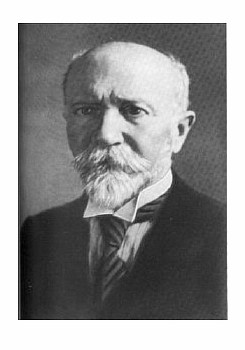|
- - - -
Nikolay Lossky
LOSSKY Nikolay Onufrievich
(18.12.1870–24.01.1965)
Philosopher, a representative of Russian religious philosophy, one of the founders of intuitionalism
Nikolay Onufrievich Lossky was born in the village Kreslavka of Dvina district, Vitebsk province (now town Kraslava, Latvia). In 1881 – 1887 he studied in Vitebsk, and graduated from St. Petersburg gymnasium. In 1895 he graduated from the Mathematics and Physics faculty, in 1898 – History and Philology faculty of St. Petersburg University. From 1900 he became a privat-docent of the Department of Philosophy. In 1901 – 1903 he worked on probation in Germany. In 1907 he took his PhD in Philosophy, since 1916 he was a Professor of Philosophy at the Department of Philosophy at Petrograd University. In 1922, as a member of the Constitutional Democratic Party he was expelled abroad by the Soviet government. From 1922 till 1945 he lived in Prague (Czech Republic), read lecture series in Brno, London, Warsaw, Paris, Belgrade, in Switzerland and the USA. From 1942 till 1945 he was a Professor of Philosophy at the University of John Amos Comenius in Bratislava (Slovakia). In 1947 – 1950 he was a Professor of Philosophy at St. Vladimir's Theological Academy in New York (the USA). From 1955 he lived in France.
He contributed greatly into the theory of cognition, ontology, history of philosophy. He created an original philosophical system, distinguished by its depth and consistency of thought. Unlike his contemporaries, he seeks to build a philosophy as science to solve a philosophical problem, elaborate and tie together the three branches of philosophical knowledge – the theory of being (ontology), theory of knowledge (epistemology), and theory of moral action (ethics). Into the bases of theory of knowledge he put a system of integral intuitionalism, according to which any objects are known by different kinds of insight (intellectual, sensual, mystical) depending on its nature. In the theory of being, which he called “personalistic ideal-realism”, he came from the fact that the world consists of many super-spatial and super-temporal substances, which are interconnected with each other and with the Supreme Beginning (God), with which they form the higher sphere of the world – the Kingdom of God. In his ethical works, he developed an ontological theory of values, according to which absolute values are embodied in the “fullness of being”, in God; the society, where the ideas about higher values and ideals, disappear, becomes the scene of unbridled egoism and moral chaos, which leads to mutual misunderstanding and bitterness, an increase in crime, spiritual impoverishment of man's inner world. The most fundamental works: “Explanation of intuitionalism” (1906), “The World as an organic whole” (1917), “Key issues of epistemology” (1919), “Free Will” (1927), “Conditions for the absolute good” (1949). The author of “The History of Russian Philosophy” (1951) and Russian translations of the “Critique of Pure Reason” by I. Kant (1907), which became the basis for all subsequent Russian editions of the writings of German philosopher. Lossky died and was buried in Sainte-Genevieve-des-Bois near Paris (France).
Proceedings:
1. Types of Ideology: an introduction into metaphysics. Paris: Publishing house “Contemporary notes”, 1931.
2. History of Russian Philosophy. New York: International Universities Press, 1951.
3. Lancelot Andrewes the Preacher (1555–1626): The Origins of Mystical Theology in the Church of England. Oxford: Clarendon Press, 1991.
4. The doctrine of reincarnation: Intuitionism. Moscow: Progress, 1992.
5. Emotional, intellectual and mystical intuition. Moscow: Terra - Book Club, 1999.
6. The world as an organic whole. Moscow: Direct-Media, 2008.
7. Recollections: The life and philosophical way. Moscow: Russian way, 2009.
Literature:
1. Dubenecky S. Lossky Mikalay Anufrievich // Religion and church in Belarus: Encyclopaedia. Minsk: Belarusian Encyclopaedia, 2001. P. 182.
2. Lossky B., Lossky N. Bibliographie des euvres de Nicolas Lossky. Institut d'etudes slaves, 1978.

© National Academy of Sciences of Belarus, 2011
|
|


